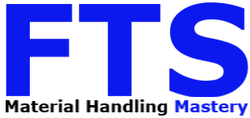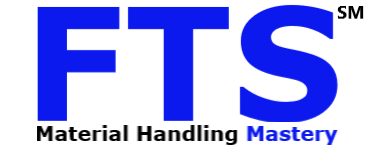
Forklift Training Specialties (FTS) is a training based, professional services provider that focuses on specific needs of companies who employ the use of Powered Industrial Trucks (PIT).
Below are the 5 principles of FTS that are considered essential to securing predictable outcomes.

Forklift Training Specialties is rooted in being a provider of the OSHA mandated Lift Truck Training and Certification.
Most would agree that proper training is the foundation of real hazard mitigation, but it is also central to controlling preventable cost and limiting the often overlooked mistakes that hinder operational efficiency.
Concerning Powered Industrial Trucks, the top priority should always be Personal Protection Awareness (PPA) since the biggest risk being mitigated is one of severe injury and death. Forklifts, in many cases, are both the most expensive and most dangerous aspect of the operation. The habits of the operators and pedestrians are the primary determining factor of whether or not a tragic accident will occur.
Habits that reduce the risk of injury and death also reduce the need for expensive service calls. When employees (operators and pedestrians) take ownership for the protection of themselves and others, they also tend to start taking better care of the equipment and facility.

Proper training is a process that doesn’t end after a forklift class, but a forklift class must be done correctly. That is why the services provided by FTS are exclusively for the users of Powered Industrial Trucks.
Staying true to the focus ensures that operator classes instill good habits, and that the instructor training brings candidates to a level competence that they can do the same for their coworkers and/or reports.
Operators and overseers of forklift operations must also understand that while in a PIT environment, and while operating PITs, a lack of focus, which is a habit, will inevitably lead to an accident. Therefore, to further emphasize this in training, a commitment to focus on and specialize in the Material Handling realm of industry is maintained.

As mentioned before, training is a process, and that process is also called leadership; another word for influence. To paraphrase, training is defined as an action to teach a person a skill or a behavior. In order for a person to have learned something, they must be able to put the teaching into action. In other words, until they have been “influenced”, they will not put into action what is being “taught”.
Understanding the process of leadership is understanding the levels of leadership. The ability to transition through the levels of leadership will determine the outcomes of the operation in terms risk mitigation versus risk exacerbation.
Increasing in the ability to transition through the levels of leadership requires “growth”, and that is why FTS is committed to maintaining a growth-oriented mindset, since that is what makes the outcomes predictable.

As a training company, a fair amount of time is spent on the development of material and courses, but FTS is centered on the development of people.
The reason personnel development remains at the core of the company is not because it is in the people business, but because that is what it takes to realize the outcomes necessary to prevent accidents.

Powered Industrial Truck Training & Certification is more than just videos, information and driving tests to meet requirements. Powered Industrial Truck training and development is about eliminating hazards through a simple process of instruction, reinforcement and retention.
Click the FTS Logo to Schedule an Appointment



